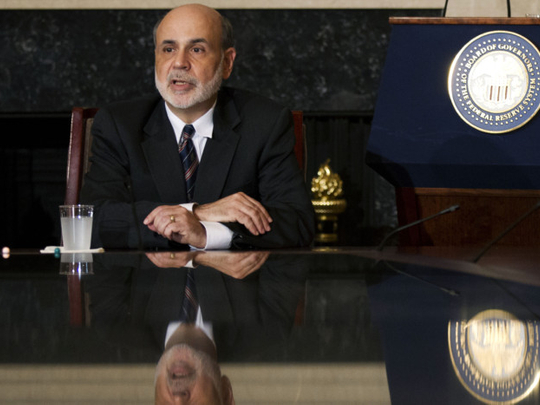
New York: Global policy makers led by Federal Reserve Chairman Ben S. Bernanke signaled support for European Central Bank President Mario Draghi’s bond-buying plan as they pressed for actions to tame the euro area’s debt turmoil.
“Some recent policy proposals in Europe have been quite constructive in my view, and I urge our European colleagues to press ahead with policy initiatives to resolve the crisis,” Bernanke said in a speech yesterday to fellow central bankers and economists in Jackson Hole, Wyoming.
European officials are stepping up efforts to beat the three-year crisis by mulling bond purchases and pursuing more regional oversight of banks. With International Monetary Fund First Deputy Managing Director David Lipton calling the world economy “very rocky,” delegates identified Europe’s fate as pivotal for growth.
“They are at a very critical stage at the moment,” Bank of Israel Governor Stanley Fischer told Bloomberg Television’s “Surveillance” with Tom Keene. Chaos in European markets is a “big fear,” he said.
ECB policy makers meet next week as investors push Draghi to detail his Aug. 2 proposal to reduce sovereign bond yields by buying debt in markets alongside Europe’s rescue fund. Draghi withdrew from the Kansas City Fed’s annual monetary policy symposium with his spokesman citing a “heavy workload.”
The euro area’s 17 national central bank governors will have about 24 hours to digest Draghi’s proposals before they begin debating them at a September 5-6 meeting, three officials said yesterday. No single policy option has emerged as preeminent, the officials said.
Increase Risk
The lack of a clear preference, the complexity of the issue and the shortage of time increase the risk that Draghi won’t present a detailed plan next week, according to economists at Commerzbank AG and JPMorgan Chase & Co. The ECB may choose to hold back some details of the plan until the German Constitutional Court rules on the legality of Europe’s permanent bailout fund on Sept. 12, two of the officials said.
The ECB should “absolutely” purchase the bonds of nations such as Italy and Spain whose yields are “out of whack” with economic fundamentals, outgoing Bank of England policy maker Adam Posen told reporters in Jackson Hole.
“It is difficult if not impossible to justify their long bond rates being as high as they are,” Posen said as he prepared to leave the U.K. central bank yesterday. “It is entirely within a central bank’s mandate and capabilities to deal with that. They should be intervening.”
Spanish 10-year yields yesterday ended trading in Europe having climbed 26 basis points, or 0.26 percentage point, to 6.86 per cent, after rising as much as 30 basis points, the most since August 2. Italy’s 10-year security yielded 5.85 percent.
Draghi Absent
Draghi’s absence from the Fed conference “indicates they really are working on operational plans to do something,” Posen said. “That is, in my view, untrammeled good news.”
Bernanke said global trade and financial linkages mean Europe’s situation has a “significant” impact on the US economy. Data yesterday showed euro-area unemployment rose to a record 11.3 per cent in June.
Draghi still faces domestic opposition, with Bundesbank President Jens Weidmann quoted in the August 26 issue of Der Spiegel as saying a new wave of ECB bond buying may increase governments’ reliance on such funding and won’t help solve the debt crisis.
Weidmann, who is in Jackson Hole, declined to comment on a report in Bild newspaper that he considered quitting over the ECB’s plan and discussed stepping down with the Bundesbank’s board. ‘I won’t comment on speculations,” he said in an interview.
Sharing Liabilities
In a paper presented to the symposium, Massachusetts Institute of Technology professor Kristin Forbes said Europe’s focus on sharing liabilities through the ECB and Europe’s rescue funds may increase the risk of contagion as investors question the solvency of countries sponsoring the bailouts.
The “best alternative” to minimize contagion today in the euro area “appears to be well-designed deposit insurance combined with appropriate banking regulations and supervision,” said Forbes, a former US Treasury official.
In response, Harvard University professor Martin Feldstein said a “significant decline in the euro” perhaps to parity with the dollar would help cash-strained European economies unable to devalue alone.













